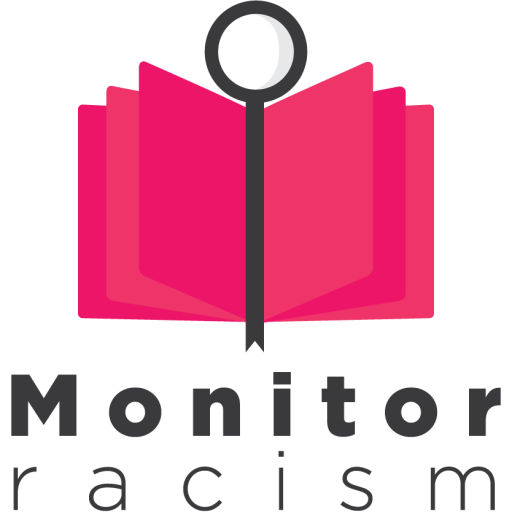Dr. Nathan G. Alexander
May 2019
“Racism” today is one of the most politically charged words in our vocabulary – and also one of the most contentious. But what exactly does “racism” mean? Is racism, for example, any attitude that one’s own racial group is superior? Is racism just about beliefs in biological superiority, or should cultural superiority also be part of the definition? Perhaps racism can only be possessed by a racial group with the most social power; in other words, can only white people be “racist”? Maybe racism is not about individual attitudes at all, but about social structures and institutions that produce racial inequality.
Proponents on all sides in these debates often point to some kind of “classical” definition of what racism truly is, while charging others with having a false notion of racism. To try to disentangle this debate, I have begun to work on a new book that will chart the history of the term racism. My goal is not necessarily to make a case for one single “correct” definition, but rather to show that historically the meaning has always been contested with many competing uses existing simultaneously. With this in mind, anyone using the term will have to argue for why their definition is right: they can’t simply assert that it is. This might, I hope, help us to have more productive debates about race in the present.
The word racism is actually relatively recent. French appears to be the first language to use the terms racisme and raciste. Surprisingly, this was in the 1890s among members of the French far right, who used the terms to describe their own racial attitudes. The author Gaston Méry coined the term “racisme” in his novel called Jean Révolte, about a man who establishes an organization to preserve the integrity of the French “Celtic” race against the supposedly dangerous influence of Jews and the “Latin” race of southern France. This idea, rather than merely “patriotisme,” he calls “racisme.”[1] Likewise, in a 1897 article, Méry called for “truly French – truly racist – voices” to defend their racial interests.[2]
Likewise, Italian fascists applied the term razzismo to their own racial policy in a document from 1938. This document argued that Italians were Aryans and called for restrictive laws against non-Aryans, particularly the Jews. Point 7 of the document even proclaimed that, “IT IS TIME THAT ITALIANS DECLARE THEMSELVES RACIST. All the work that the Regime has done until now in Italy is essentially a form of racism.”[3] These instances are surprising, since today “racism” is always used in a negative way; even the most outspoken white supremacists are reluctant to apply the term to themselves.
The first English use of the term “racism” came in 1902 by a white general named Richard Henry Pratt, who spoke at a meeting of a group formed to protect Native Americans. There he said, “Segregating any class or race of people apart from the rest of the people kills the progress of the segregated people or makes their growth very slow. Association of races and classes is necessary in order to destroy racism and classism.”[4] The sentiment seems admirable at first glance, but a different story emerges when we look more closely.
Pratt feared that Native Americans would soon disappear due to disease and starvation brought on by white settler encroachment. Their only chance of survival, he believed, was through their total assimilation into western culture. With this in mind, he set up a boarding school for Native American children, which provided food and shelter for otherwise impoverished children. But the school also punished children for speaking their native languages and forced them to adopt Christianity. This practice of forced assimilation exemplified Pratt’s infamous saying: “kill the Indian” and “save the man.”[5] In this sense, then, Pratt’s call for an end to segregation and “racism” takes on a whole new meaning. For Pratt, to argue against “racism” meant arguing in favour of forced assimilation.
Use of the term was, however, still rare before the 1930s and 40s in English and other European languages. We can chart the changing frequency of the word “racism” by using the Google Books Ngrams Viewer, a tool which scans through a database of several million books.[6] Looking at the graphs for “racism” and its counterparts in other languages, we see a similar pattern showing the usage of the term first becoming widely used in the 1930s and 40s and continuing to increase throughout the century (see the table below).
“Racism” in the 30s and 40s was used especially to denounce Nazi racial doctrines. Probably the first use of the term in the title of an English book was the translation by Eden and Cedar Paul of the German Jewish sexologist Magnus Hirschfeld’s unpublished manuscript Rassismus as Racism in 1938, which criticized doctrines of biological racial superiority.[7] Other works in this period also used the term to condemn theories of racial superiority. Indeed, the first chapter of Ruth Benedict’s 1940 book, Race: Science and Politics, was entitled, “Racism: The ‘Ism’ of the Modern World.”[8]
Usage of the term rises dramatically in the 1960s and 70s. This was a time when people of colour asserted their rights more than ever before with decolonization in Africa and Asia and mass movements in the United States and elsewhere which demanded equal civil and political rights regardless of race.
New understandings of “racism” also emerged in these years. In particular, the idea surfaced that “racism” did not just pertain to individual attitudes or doctrines, but also to society. In the 1967 book, Black Power, by Stokely Carmichael (later Kwame Ture) and Charles V. Hamilton, the authors differentiated “institutional racism” from “individual racism.” This passage perhaps best demonstrates the difference between the two concepts:
When white terrorists bomb a black church and kill five black children, that is an act of individual racism, widely deplored by most segments of the society. But when in that same city – Birmingham, Alabama – five hundred black babies die each year because of the lack of proper food, shelter and medical facilities, and thousands more are destroyed and maimed physically, emotionally and intellectually because of conditions of poverty and discrimination in the black community, that is a function of institutional racism.[9]
This conception of “racism” as being rooted in social structures or institutions has gained much traction today, even as it exists somewhat uneasily alongside the understanding of “racism” as an individual phenomenon.
In reviewing some of the history of the term “racism,” we can see that there is no single, “correct” meaning of the word to which we can refer. Indeed, some of the earliest uses of the word differ from our understandings of what “racism” means today.
The meaning of words isn’t handed down to us from the gods; we make the meanings ourselves and this is why multiple and even conflicting meanings can exist simultaneously. It might make sense, therefore, to think of words as tools, or even weapons, that we use for certain purposes at certain times. If this is so, it’s up to us to wield them with care.
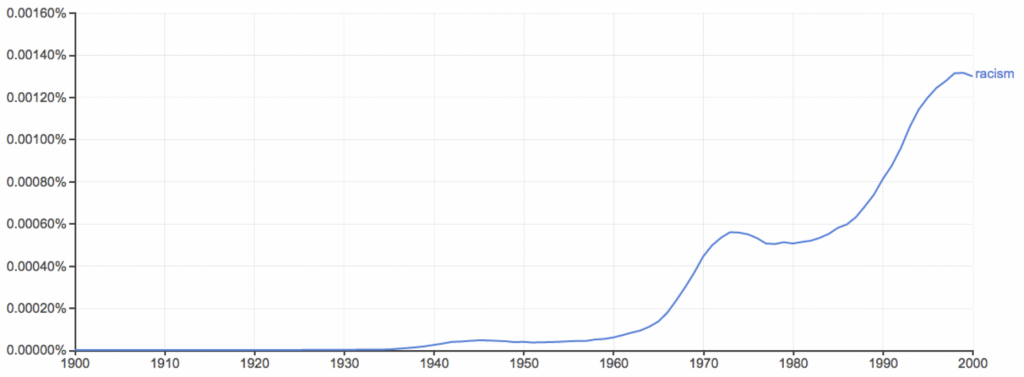
“racism” in the English corpus
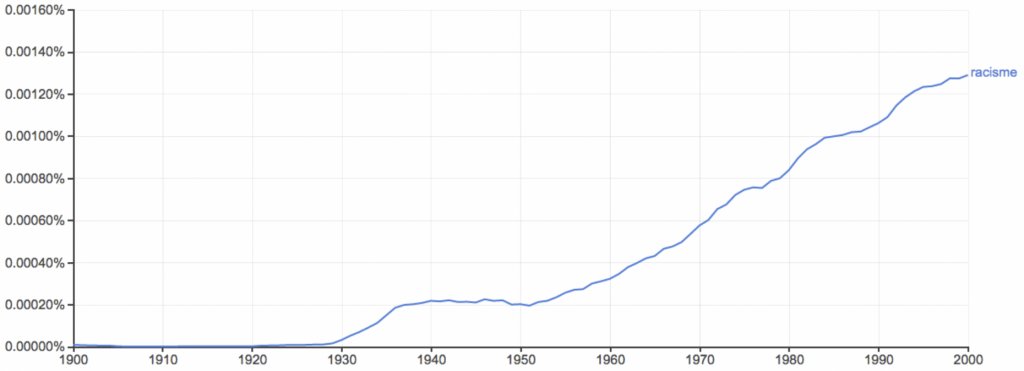
“racisme” in the French corpus
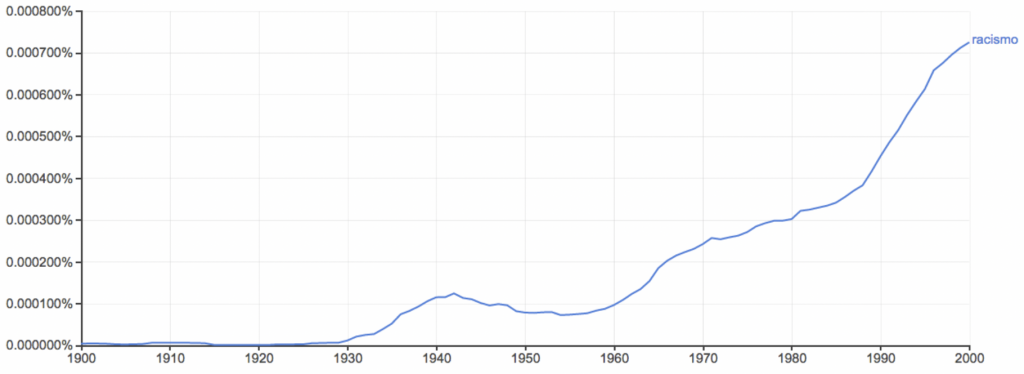
“racismo” in the Spanish corpus
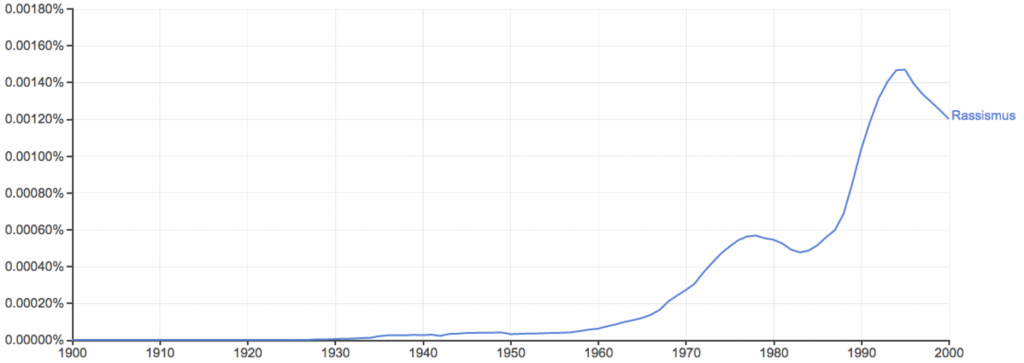
“Rassismus” in the German corpus
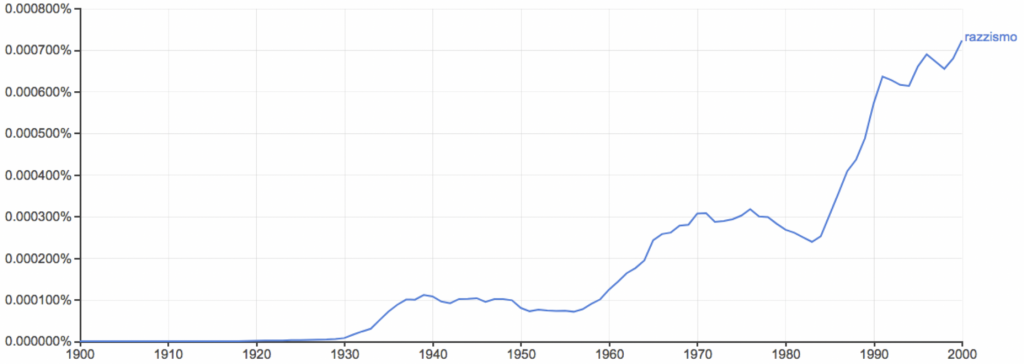
“razzismo” in the Italian corpus
Nathan
G. Alexander is a postdoctoral fellow at the Max Weber Centre for Advanced
Cultural and Social Studies, University of Erfurt, Germany. He is the author of
Race in a
Godless World: Atheism, Race, and Civilization, 1850-1914 (Manchester University Press
and NYU Press, 2019). This article is part of a project that has received
funding from the European Union’s Horizon 2020 research and innovation program
under the Marie Skłodowska-Curie grant agreement No 665958.
[1] Gaston Méry, Jean Révolte, Roman de Lutte (Paris: E. Dentu, 1892), 71–72.
[2] Quoted in Pierre-André Taguieff, The Force of Prejudice: On Racism and Its Doubles, trans. Hassan Melehy (Minneapolis: University of Minnesota Press, 2001), 85. Italics in original.
[3] “Razzismo Italiano,” La Difessa Della Razza 1, no. 1 (August 5, 1938): 3, https://it.wikisource.org/wiki/La_difesa_della_razza_(anno_I,_numero_I,_1938)/Razzismo_italiano; I used the translation from Gabriele Abbondanza, Italy as a Regional Power: The African Context from National Unification to the Present Day (Rome: Aracne, 2016), 295–96.
[4] Isabel C. Barrows, ed., Proceedings of the Twentieth Annual Meeting of the Lake Mohonk Conference of Friends of the Indian 1902 (Published by Lake Mohonk Conference, 1903), 134.
[5] Gene Demby, “The Ugly, Fascinating History Of The Word ‘Racism’,” NPR Code Switch, January 6, 2014, https://www.npr.org/sections/codeswitch/2014/01/05/260006815/the-ugly-fascinating-history-of-the-word-racism?t=1529438155366.
[6] The use of Google Ngrams is described here: Jean-Baptise Michel et al., “Quantitative Analysis of Culture Using Millions of Digitized Books,” Science 331, no. 6014 (January 14, 2011): 176–82.
[7] Magnus Hirschfeld, Racism, trans. Eden Paul and Cedar Paul (London: Victor Gollancz, 1938).
[8] Ruth Benedict, Race: Science and Politics, Revised Edition (New York: The Viking Press, 1945 [1940]).
[9] Kwame Ture and Charles V. Hamilton, Black Power: The Politics of Liberation in America, Vintage Edition (New York: Random House, 1992), 4.
